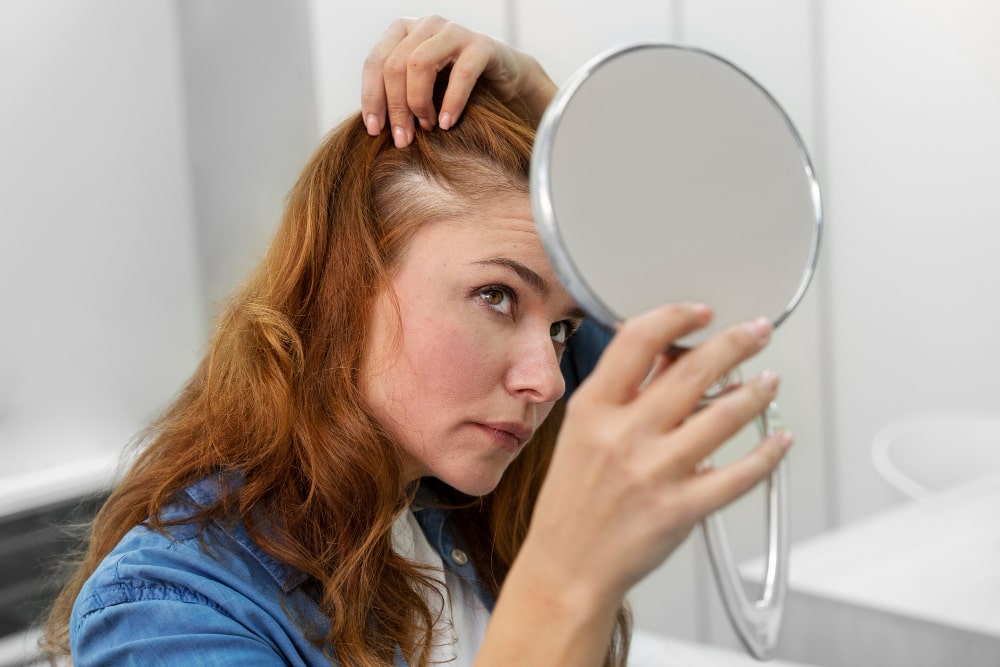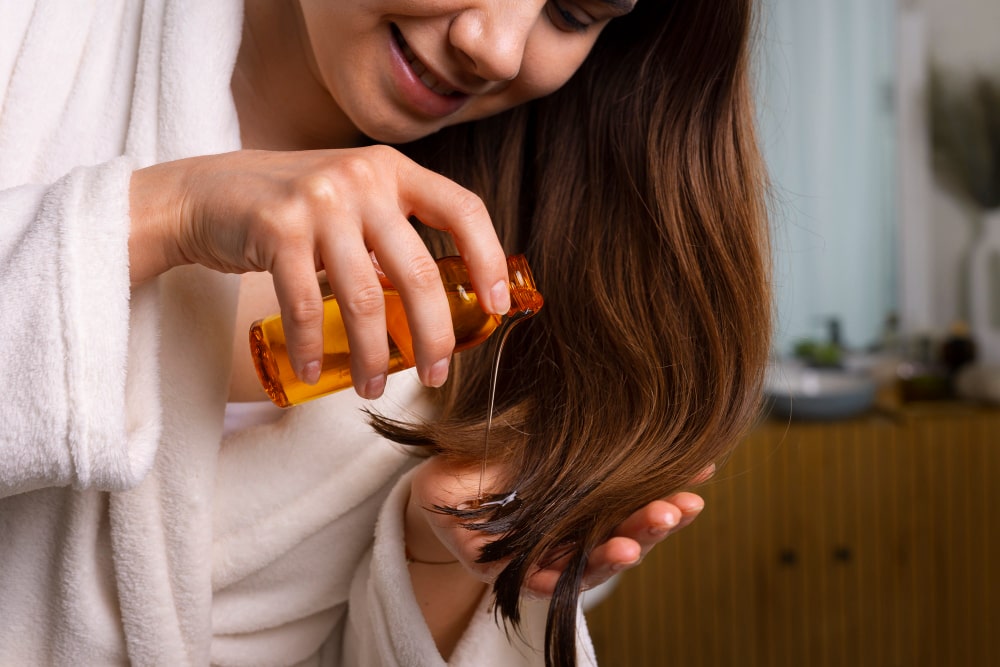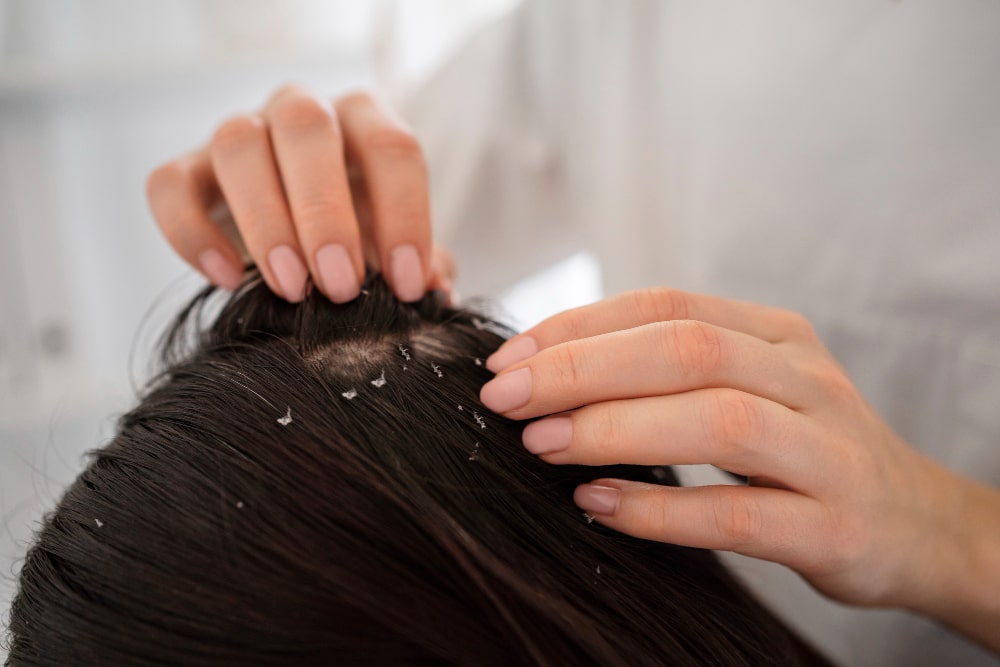A dry scalp is an uncomfortable condition that can occur on any part of the body. Studies have found a link between this condition and hair loss, as dryness or dry scalp can weaken the hair follicles and cause them to become unhealthy or hair loss. In this article, we will discuss can dry scalp cause hair loss, how a dry scalp affects your hair health, nutritional supplements for relief, and tips to prevent hair loss. Read on for more information about the relationship between dry scalp and hair loss.
What is Dry Scalp?
A dry scalp is a common affliction that causes flaking, irritation, and skin itching. It can be caused by environmental factors such as cold weather or too much sun exposure, skin conditions such as eczema or psoriasis, and poor hair care practices. It is important to understand what causes your dry scalp to treat it better.
The Link Between Dry Scalp and Hair Loss
A dry scalp can cause to hair loss because it weakens the hair follicles, making them less healthy and more prone to breakage or fallout. A dry scalp can also cause the hair shafts to become brittle, which makes them more vulnerable to damage and breakage.
Read More: Can Low Vitamin D Cause Hair Loss? How to Maintain Level
Common Causes of Dry Scalp
There are several common causes of dry scalp that you should be aware of, including environmental factors, skin conditions, and hair care practices.
1) Environmental Factors
Environmental factors such as cold weather, dry air, sun exposure, and wind can all contribute to dry scalp. Windy conditions, in particular, can blow away the natural oils that help keep your scalp moisturized.
2) Skin Conditions
Various skin conditions, such as eczema and psoriasis, can cause dryness and irritation of the scalp. They can also cause to hair loss due to inflammation or irritation of the hair follicles.
3) Haircare Practices
Poor hair care practices such as using harsh shampoos or conditioners, dyeing your hair frequently, or over-styling with hot tools can all contribute to dry scalp and hair loss. It would be best to be mindful of the products you use on your hair and scalp, as they can majorly impact your hair health.

Read More: Can Wearing a Hat Cause Hair Loss: Everything You Need to Know
The Impact of Dry Scalp on Hair Health
Dryness and scalp irritation can lead to several issues with your overall hair health, from weak follicles to brittle strands. It can also increase the risk of scalp infections, which can be damaging to your hair and cause further hair loss. It is important to address dry scalp to keep your hair healthy and prevent further damage.
Nutritional Supplements for Dry Scalp
There are several nutritional supplements that can help to reduce the symptoms of dry scalp, including omega-3 fatty acids and biotin. Omega-3s help to promote healthy skin cell growth, while biotin helps to strengthen the hair from the root. These supplements can be taken orally or applied topically to your scalp to reduce dryness and irritation.
Read More: Foods That Cause Hair Loss: Everything You Need to Know
Addressing Dry Scalp to Prevent Hair Loss
There are several strategies that you can use to address dry scalp and prevent hair loss, including home remedies and treatments, professional interventions, and haircare tips.
Are there any home remedies for dry scalp?
Some natural home remedies that may help relieve the symptoms of dry scalp include;
Using natural oils such as coconut, olive, or lavender oil to moisturize the scalp .
Using a gentle shampoo with natural ingredients such as aloe vera or honey.
Making a mixture of apple cider vinegar and water and massaging it into your scalp for relief.

Professional Interventions
If home remedies don’t work, consider seeing a professional for further help. Dermatologists or trichologists may be able to diagnose the cause of your dry scalp and recommend treatments such as topical creams or light therapy. They may also suggest prescription medications if needed.
Read More: Can Creatine Cause Hair Loss? Understanding the Connection
Hair Care Tips to Prevent Dry Scalp and Hair Loss
In addition to addressing dry scalp, it is important to take preventive measures to protect your hair from further damage. Here are some tips for preventing dry scalp and hair loss:
1) Proper Shampooing and Conditioning
Make sure you shampoo your hair regularly with a gentle shampoo and use a conditioner afterward to keep the scalp moisturized. Avoid using harsh shampoos or ones with harsh chemicals that can irritate the scalp.
2) Moisturizing the Scalp
Moisturize your scalp regularly to prevent dryness and irritation. You can moisturize the scalp with natural oils such as coconut or olive oil. You can also use a leave-in conditioner or an oil-based hair mask to keep your scalp hydrated and healthy.
3) Diet and Hydration
Make sure you eat a balanced diet with plenty of fruits, vegetables, proteins, and healthy fats to nourish your scalp from the inside out. Additionally, make sure you are drinking enough water to keep your scalp hydrated.
4) Avoiding Harsh Hair Styling Products
Avoid over-styling your hair with hot tools or harsh products such as gels, waxes, and sprays. These can cause dryness and damage to the scalp and hair follicles.
5) Protecting Hair from Sun Damage
The sun’s ultraviolet rays can damage the scalp and cause to dryness. To protect your scalp from sun damage, wear a hat or scarf when outdoors and avoid excessive exposure to the sun.
Read More: Does Diabetes Cause Hair Loss: Exploring the Connection
Conclusion
In conclusion, although a dry scalp can cause hair loss, there are many strategies you can use to address it. By understanding the link between dry scalp and hair loss, identifying common causes of dry scalp, taking nutritional supplements to help reduce symptoms, and following haircare tips to prevent further damage, you can keep your scalp healthy and strong. With a little care and attention, you can keep your scalp hydrated and prevent hair loss due to dryness.
Read More: Can Low Calcium Cause Hair Loss? Everything You Need to Know
FAQs
A: The most common symptom of dry scalp is an uncomfortable and itchy feeling on the scalp. Other signs may include redness, flaking, dandruff, or irritation.
A: To help prevent hair loss due to a dry scalp, you should make sure that you are using a gentle shampoo and conditioner, moisturizing your scalp regularly with natural oils such as coconut or olive oil, eating a balanced diet, drinking enough water, avoiding harsh hair styling products, and protecting your scalp from sun damage. Additionally, if home remedies don’t work for relieving symptoms of dry scalp, you should consider seeing a professional for further help.
A: Yes, hot weather can contribute to a dry scalp. Exposure to heat and UV rays can cause the scalp to become dehydrated, leading to dryness and irritation. To protect your scalp from sun damage, wear a hat or scarf when outdoors and avoid excessive exposure to the sun. Additionally, ensure you drink enough water throughout the day to keep your scalp hydrated.
A: Yes, there is a link between stress and dry scalp. Stress can cause the sebaceous glands of the scalp to produce less oil which in turn can lead to dryness and irritation. To help reduce stress levels, make sure you are getting adequate rest, eating healthy meals regularly, exercising regularly, meditating, and engaging in activities that make you feel relaxed. Additionally, if stress levels are becoming too much to manage independently, consider speaking to a mental health professional for further help.

